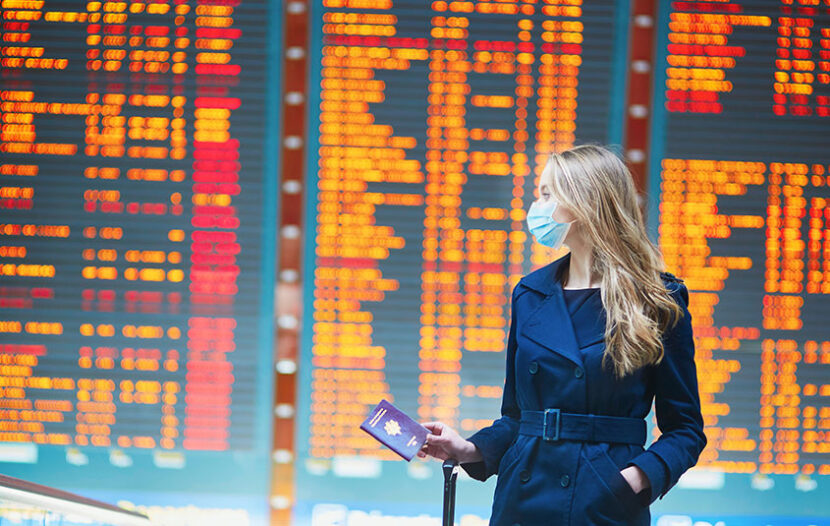TORONTO — It’s tricky enough these days making a living in the travel industry, without worrying about getting travel shamed for marketing your travel services – even for future travel – or getting pushback for taking vacations.
Travel shaming reached a high point (or, for the industry, a low point) at the start of 2021 when several politicians and others in the public eye were vilified for vacationing over the Christmas holidays with the advisory against non-essential travel still in place, and with most of Canada deep in the second wave.
Travel agents were targets of travel shaming too, especially on social media, where some followers were quick to weigh in with negative comments in reaction to posts about booking travel. Agents who took fam trips in fall 2020 were often on the receiving end of these types of comments, sometimes even from travel industry colleagues.
Ultimately the rising COVID-19 numbers during the second wave, coupled with growing backlash against travel during the pandemic and fears for spiking caseloads with March Break on the horizon, led to the federal government securing agreements from Air Canada, WestJet, Sunwing and Transat in late January 2021 to temporarily suspend all winter sun flights. On the same day, the federal government also announced the 3-day hotel quarantine requirement as another layer added to Canada’s already considerable travel restrictions.
ONE TRAVEL AGENT’S EXPERIENCE
Michelle Whalen, a travel agent with Uniglobe Enterprise Travel Ltd. in London, ON went to Mexico in November 2020 with a friend. “I held off telling friends, contacts and clients about it for fear of shaming,” says Whalen, adding that she didn’t share news about her Mexico trip until three or four months later, when she posted a video about it. “In the video I did not name the friend I had gone away with for fear she would experience shaming. I know she did not tell her extended family, coworkers, and many friends that she had travelled. I had been debating whether to share it or not and a mentor encouraged me that clients want to hear our personal experiences.”
In posting the video, Whalen says she asked followers to help her maintain a positive, encouraging tone by going the private messaging route if they had any negative comments. She was also careful with her wording in the video. “I tried to be very sensitive and emphasize ‘when the time is right for you’, as opposed to ‘travel now’,” she says.
Whalen’s close attention to messaging has paid off. “When I review this past 12 months+ of posts and comments, there really hasn’t been anything negative or shaming. Part of that is being sensitive in our messaging,” she says. “We’ve held back from promoting ‘book now, travel later’. The tone of our messaging has been posts that are inspirational or that highlight destinations. When I reviewed the past year or so, 95% of our content has been that focus. That messaging will continue for some time in 2021 as opposed to strongly offering future promotions.”
While there’s a lot of solidarity in the industry these days, not everyone is in agreement when it comes to promoting travel and taking vacations. “I do find that even within our industry our colleagues, fellow advisors are shaming and judgmental,” she says. “A couple of my colleagues who did travel also were very cautious sharing their experiences on social media.”
HOW LONG UNTIL TRAVEL SHAMING GOES AWAY?
Now that Canada’s vaccination rollout is gaining momentum, there’s talk even beyond the travel industry about the need for a reopening plan. That’s true about the Canada-U.S. border especially, now that the U.S. is making such great strides with its own vaccination program.
Months or potentially even weeks down the line, as travel begins to reopen to and from Canada, will travel shaming kick into high gear again as those who feel it’s ‘still too soon’ judge others who feel ‘the time is right’?
Travelweek caught up with Dr. Alan Fyall, Graduate Programs’ Director at the Rosen College of Hospitality Management, University of Central Florida, to get his take on travel shaming from his vantage point south of the border, where domestic travel especially has very quickly ramped back up.

Dr. Alan Fyall, Graduate Programs’ Director at the Rosen College of Hospitality Management, University of Central Florida
Q: Travel has started to reopen in the U.S., which is great. Even with those positive achievements, is travel shaming still happening?
Dr. Fyall: “The high rate of vaccinations across the U.S. in particular is helping to ‘normalize’ travel once again with so-called ‘travel shaming’ less obvious than it was even a month ago. Yes, where irresponsible and reckless behaviour occur then the shaming is quick to follow but for those in the majority who are observing the guidelines in place, travel is becoming a pleasurable experience again.
“Much of the shaming has been caused by frustrations of being in perpetual lockdown and seeing others, in other states or countries, getting back to some sense of normality. The frustrations in Europe in particular reflect the slow vaccination program with some sense of envy over those in the UK, Israel and the USA where vaccination programs are proving highly effective. Also, in states such as Florida where travel is such a huge contributor to the economy, travel is viewed in a positive light as the traveling population are contributing to the re-opening of the industry and so many peoples’ livelihoods.”
Q. What’s your take on why travel shaming has become so rampant?
Dr. Fyall: “Much of the shaming is borne out of frustration with others benefiting from faster vaccination programs and a sense of envy that they in their own situation, a return to normality still seems to be a long way off. … With so many people still furloughed in many parts of the world, social media represents the one easy outlet to share frustrations when in reality …. most people would rather be travelling themselves!”
Q. Here in Canada it’s very much still a no-travel situation, with multiple layers of very challenging travel restrictions. Many of our travel agent readers have been shamed on their social media accounts for even promoting travel for future. Are there ways to deal with this shaming in a polite and professional way?
Dr. Fyall: “Sensible travel, adhering to the guidelines in place, staying local, enjoying the natural environment are all ways to demonstrate that travel can be conducted safely. In addition, choosing brands that have made a huge effort to be safe, avoiding what you think may be crowded areas, and observing the simple ‘mask up’ mandates where they exist all help. As for avoiding travel shaming, it’s easy, avoid posting on social media until normality really has returned …. something that many travellers are undoubtedly doing already.”
Q. Will travel shaming go away when the pandemic subsides, or do you see it having a long-lasting impact on the travel industry?
Dr. Fyall: “As with so many other ‘hot topics’ such as COVID passports, once vaccination levels really do reach the necessary threshold, shaming will diminish with travel once again becoming normal, and acceptable, once again, albeit travel in a post-COVID world!”


